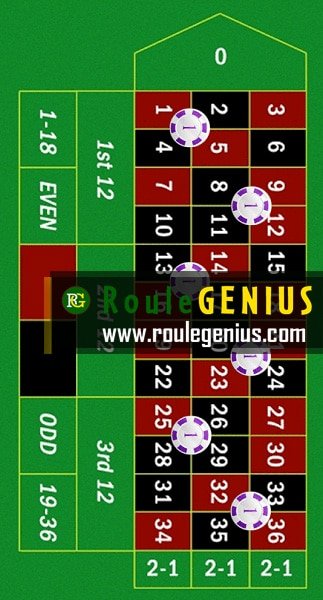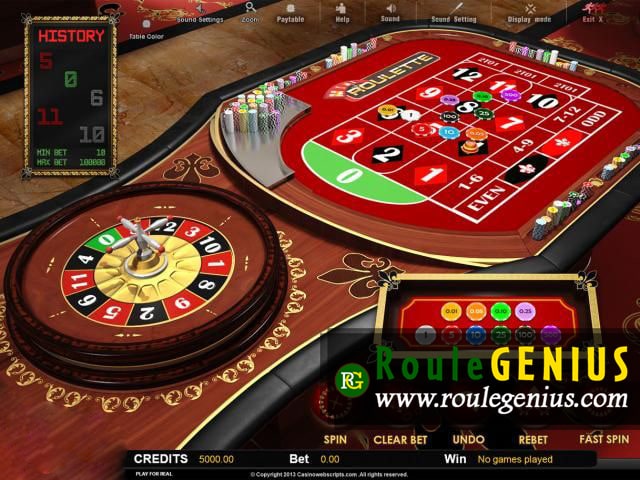Fiction about roulette: Bankroll Management Helps You Win
Unless your roulette strategy changes the odds of you winning, bankroll management will only make you lose at a faster or slower rate. Specifically, positive progression will make you lose faster, and negative progression makes your bankroll last longer (because your bets get smaller). Is that fiction about roulette or not?
Why doesn’t bankroll management help? Because it just controls the amount you bet. The wheel doesn’t care what you are betting. Your bet size doesn’t influence it. Your bets are not changing the odds or payouts.
FICTION about Roulette: You Only Need a Short-Term Winning Strategy

There are many strategies that aim to win perhaps +1 units each day. It will hardly cover the cost of car parking. But still, let’s use this as an example and say your goal was to win just +1 unit. It seems simple enough, right? Many players have claimed they have a holy grail that will win a set amount per day, but the strategy’s rules require you to leave after winning the target amount.
Ask yourself:
- If the strategy worked, wouldn’t playing more mean winning more?
- What if 10,000 players all used the same system? Would they all win +1 unit?
- What if 1 player used the same system 10,000 times?
A roulette strategy either wins in the long term or loses in the long term. Whether you bet on just 1 spin or 1,000 spins, the casino will have the same edge over you. That is unless you are able to change the odds of winning.
Fiction about roulette: Roulette has streaks you can use for advantage
Even with numbers from a random number generator, there will inevitably be times when the same number spins several times in a row. These are simple statistics, and such “freaky streaks” are bound to happen eventually. The odds of 0 spinnings three times in a row are 1 in 50653. But what are the odds of 0,0 then 2 spinnings? Also, 1 in 50653. So ask yourself why would you bet 0 after it had spun twice consecutively.
The same concept applies to any other bet. For example, you may wait for the first dozen to spin three times consecutively, then bet on the second and third dozens. But the odds of each dozen spinning next haven’t changed at all.
Related Posts:
Roulette Methods to win at roulette: The Greatest Successful Roulette Methods
Win at roulette based on some facts: Interesting Facts about roulette
How to avoid fake roulette methods: Keep away from well-known roulette methods
Fiction about roulette: A strategy that “lasts” for 20,000 spins is better than most systems
A strategy will either lose or win in the long term. If you use a negative progression where you decrease bet size after losses, you can make your bankroll last longer. But the end result will still be a loss.
Alternatively, you could wait for rare “triggers” which mean you skip many spins before betting. Then you apply an aggressive betting progression and may get lucky with a big win. The result of this is a lot of spins will occur, but you rarely bet. So you can last many thousands of spins without blowing your bankroll. This doesn’t make the system good. It just makes a losing strategy more boring to use. A strategy like this on a bankroll trend chart will show a lot of dramatic up-and-down bankroll spikes.
If you have a good roulette system tester, try creating a system with random bets. You’ll find that even occasionally it will be profitable to test over 20,000 spins. It doesn’t mean the system “works”. It just means you got lucky. Try repeating the test a few times. Certainly, there would be many players around using totally ineffective strategies, who have still profited purely from luck. Most players will never play 10,000 spins in their life, and it is still easily possible to profit after 10,000 spins with a losing system from luck. Reality may catch up with them eventually, or they may end their roulette career with a profit despite an ineffective strategy.

FICTION about roulette: Waiting for a trigger to bet increases your chances of winning
You will either have a positive or negative edge and waiting for something to happen like a sequence of numbers will not improve your chances of winning. The exception is if the “trigger” is directly related to a sequence of spins caused by physical variables of the wheel and ball. For example, if the trigger was “bet on whatever number that won most in 10,000 spins”, then this is bias analysis. But the “triggers” that have no effect are like “wait for 5 reds in a row then bet black”.
FICTION about roulette: Winning after you reach your target profit for the day helps ensure daily profits
It makes no difference if you play 1 spin a day for 100 days or 100 spins in 1 day. It’s still 100 spins. The odds of you winning or losing are the same in either case.
FICTION about roulette: Skipping spins you bet on can help you profit in the long term
If you tested a system over 1,000 spins, your “trigger” may require you to bet on only 200 spins (20% of spins). If you profited, it doesn’t mean you’ve won over 1,000 spins. It means you’ve won over just 200 spins.
IMPORTANT: RouleGENIUS revealed the truth about the ROULETTE Algorithm into the first FREE Video COURSE on the web about how to win at roulette. This course teaches you about the roulette algorithm and how it actually detect winnings predictions. Follow the FREE Roulette Course and increase your income.
So if you like it, get our ELITE Package where we reveal secrets about how to reach 94.7% of winning! And that is NOT all: we also offer you 25 secrets to WIN at roulette and a full pdf guide!
DOWNLOAD and Purchase:
Android App: DOWNLOAD Android app from GOOGLE PLAY
Windows app: DOWNLOAD Windows Version of RouleGENIUS
Purchase License: SEE the available PACKAGES to PURCHASE a LICENSE
Useful Links that may interest you:
About RouleGENIUS: Which are the RouleGENIUS roulette software features?
More about the Secrets: What are THE 25 SECRETS TO WIN at roulette?
About Configuration: Video Tutorials about how to configure RouleGENIUS Roulette Predictor
About Proofs: Winning Video proofs of using RouleGENIUS roulette
software
FAQ Page: The most FREQUENTLY asked QUESTIONS from visitors




